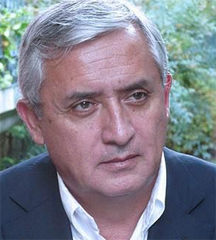ANTIGUA, Guatemala, (Reuters) – Guatemalan President Otto Perez on Saturday set out a raft of proposals to tackle rampant drug-fuelled violence in Central America, including decriminalization of narcotics or establishing a regional court to try traffickers.

“The proposal is decriminalization,” Perez said at a regional summit to address security throughout the region. “We are talking about creating a legal framework to regulate the production, transit and consumption of drugs.”
The discussion reflects growing concern in Central America about the cost of the war on drugs, which is prompting leaders to take an increasingly independent line from the United States, where officials have repeatedly rejected legalizing narcotics.
A retired general, Perez won election in November 2011 promising to crack down on organized crime. But he shifted from his hard-line message shortly after taking office in January, calling for a more open debate on drug policy.
“It’s important this is on the discussion table as an alternative to what we’ve been doing for 40 years without getting the desired results,” he said, noting that decriminalization would erode drug cartels’ profits.
The president added that Central American leaders are considering requiring the United States, the biggest consumer of South American cocaine, to pay the region for drug raids.
“We’re talking about economic compensation for every seizure undertaken and also the destruction of marijuana and cocaine plantations,” said Perez, a 61-year-old conservative.
Guatemala’s murder rate has nearly doubled since 2000 due in part to brutal Mexican drug cartels extending their reach south.
In May 2011, the feared Zetas gang beheaded 27 farm workers in northern Guatemala in a dispute with the farm’s owner over cocaine moving from South America to the United States.
Another alternative Cen-tral American leaders are mulling is setting up a court with jurisdiction for the region that would hear crimes related to the drug trade like kidnapping, contract killing, and trafficking of people and arms, Perez added.
“This would give breathing space to the justice system because it would relieve pressure on our courts,” he said, adding that the court would have its own penal system.
CAUGHT IN THE
SANDWICH
Regional leaders in countries affected by drug violence have called for more open debate on other solutions to the problem.
Mexican President Felipe Calderon, to whom Perez has turned for advice on confronting the cartels, has called on Washington to take more responsibility for reducing demand for drugs, and has said he is open to debates about legalization.
Calderon has been mired in a costly struggle since he launched an army-led crackdown on the drug gangs shortly after taking office in late 2006. Drug violence has spiked since then, claiming some 50,000 lives in Mexico.
Colombian President Juan Santos, whose country produces much of the cocaine shipped north, has alsodemanded a new approach.
Washington has defended the war on drugs and in recent visits to the region U.S. Vice President Joe Biden and Secretary of Homeland Security Janet Napolitano rejected Perez’s legalization pitch, citing a fall in Colombia’s murder rate.
Perez, the founder of Guatemala’s right-wing Patriot Party, said Central America was paying too heavy a price for the war.
“Our countries are not producers or consumers of drugs,” he said. “We are in the middle of the sandwich.”
In the past two months alone, Guatemala has confiscated more than 1,000 kilos (2,200 pounds) of cocaine valued at roughly $10,000 per kilo, and destroyed nearly $1 billion worth of poppy plants.
